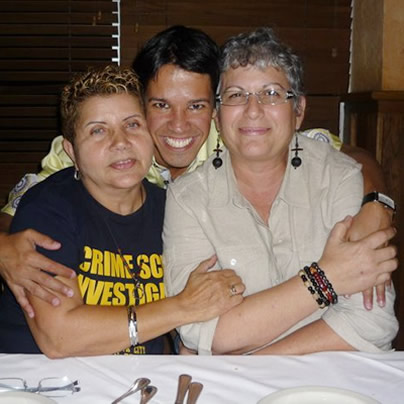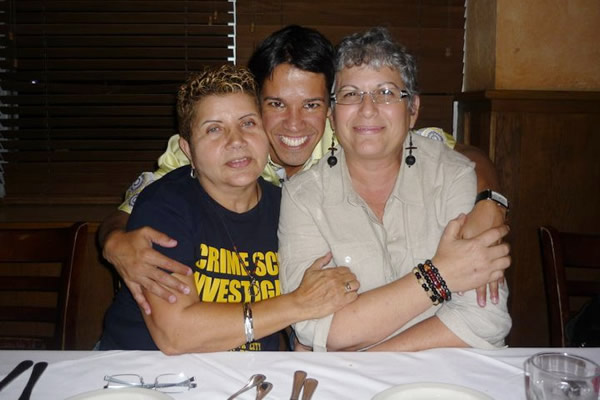National
Lesbian couple files marriage lawsuit in Puerto Rico
Ada Conde Vidal and Ivonne Álvarez Velez seek recognition of Mass. wedding


Ivonne Álvarez Velez, left, with Pedro Julio Serrano of Puerto Rico Para Tod@s and Ada Conde Vidal. (Photo courtesy of Pedro Julio Serrano)
“We wish to enjoy the same social privileges and contractual rights that are conferred by the commonwealth on individuals in opposite-sex marriages and not to be treated as we are being treated as second class citizens differentiated, alienated and discriminated in comparison to other U.S. citizens,” say Ada Conde Vidal and Ivonne Álvarez Velez in their lawsuit they filed in U.S. District Court of Puerto Rico in San Juan. “Puerto Rico law precluding recognition of lawful same-sex marriages denies us those rights in violation of the Equal Protection and Due Process Clauses of the 14th Amendment of the U.S. Constitution.”
Conde and Álvarez, who have been together for nearly 14 years, exchanged vows in Massachusetts in 2004 shortly after the state’s same-sex marriage law took effect.
Puerto Rican lawmakers in 1999 amended the U.S. commonwealth’s civil code to ban recognition of same-sex marriages – even those legally performed in other jurisdictions. Unions in which one person is transgender are also not recognized.
Conde, who is a lawyer, says in the lawsuit that Álvarez could not make medical decisions on behalf of her daughter who had open heart surgery because Puerto Rican officials do not recognize their relationship. The couple is also unable to file their income taxes in the U.S. commonwealth as a married couple.
“If she dies, I want my marriage legally recognized,” Conde told the Washington Blade on Wednesday. “If I am not recognized, I will not have any rights to request her estate.”
The lawsuit names Puerto Rico Health Secretary Ana Rius Armendariz and Wanda Llovet Díaz, director of the Puerto Rico Demographic Registry, as defendants.
“The commonwealth of Puerto Rico statutory provision has created a legal system in which civil marriage is restricted solely and exclusively to opposite-sex couples, and in which gay and lesbian individuals are denied the right to enter into a civil marriage,” say Conde and Álvarez. “The commonwealth of Puerto Rico statutory provision also deprives same-sex couples of federal marital privileges and benefits that, upon information and belief are available to same-sex couples who marry under state laws authorizing such benefits but that are not available to plaintiffs and other same-sex couples in Puerto Rico.”
18 states and D.C. have extended marriage rights to same-sex couples.
The 10th U.S. Circuit Court of Appeals in Denver next month is scheduled to hold oral arguments in two cases challenging the constitutionality of state constitutional amendments that ban same-sex marriage in Oklahoma and Utah. The 4th U.S. Circuit Court of Appeals in Richmond, Va., in May is slated to hear a case that challenges Virginia’s gay nuptials ban.
The 9th U.S. Circuit Court of Appeals in San Francisco in the coming months is expected to hear oral arguments in a challenge to Nevada’s same-sex marriage ban. A federal appeals court in New Orleans will likely hear a similar case that challenges Texas’ gay nuptials prohibition after U.S. District Judge Orlando L. Garcia last month ruled the state’s same-sex marriage ban is unconstitutional.
The 6th U.S. Circuit Court of Appeals on Tuesday placed a hold on same-sex marriages in Michigan pending an appeal of a lower court ruling that struck down the state’s gay nuptials ban.
A federal judge late last month ordered Kentucky to recognize marriages legally performed outside the state. Gays and lesbians in Florida, Alabama, Arizona, West Virginia and other states have also filed lawsuits seeking the right to marry since the U.S. Supreme Court last June struck down a portion of the Defense of Marriage Act.
The federal government recognizes legally married same-sex couples for tax and other purposes.
U.S. Attorney General Eric Holder last month announced the Justice Department will now recognize same-sex marriages in civil and criminal cases and extend full benefits to gay spouses of police officers and other public safety personnel – even in states that have yet to allow nuptials for gays and lesbians. He said a few weeks later that state attorneys general do not have to defend same-sex marriage bans.
Kentucky Attorney General Jack Conway, Nevada Attorney General Catherine Cortez Masto and Virginia Attorney General Mark Herring are among those who have declined to defend same-sex marriage bans in their respective states.
Pedro Julio Serrano of Puerto Rico Para Tod@s, a Puerto Rican LGBT advocacy group, noted to the Blade that Gov. Alejandro García Padilla last June applauded the U.S. Supreme Court’s DOMA ruling that applies to the American commonwealth. Serrano added he hopes Puerto Rico Justice Secretary César Miranda will not defend the island’s same-sex marriage ban in court.
“It is incumbent upon them to do the right thing if they truly believe in LGBT equality,” Serrano told the Blade, noting García has signed four pro-LGBT measures into law since taking office in January 2013. “It’s incumbent upon them not to defend this law because it’s unjust.”
Multiple attempts to reach the Puerto Rico Justice Department for comment on Conde and Álvarez’s lawsuit on Wednesday were unsuccessful.
“I’m a U.S. citizen,” Conde told the Blade. “I have the same rights in the Constitution no matter where I am – in a territory, a commonwealth or a state. I’m claiming my full citizenship and equality as any other citizen in the United States of America.”
Federal Government
UPenn erases Lia Thomas’s records as part of settlement with White House
University agreed to ban trans women from women’s sports teams

In a settlement with the Trump-Vance administration announced on Tuesday, the University of Pennsylvania will ban transgender athletes from competing and erase swimming records set by transgender former student Lia Thomas.
The U.S. Department of Education’s Office for Civil Rights found the university in violation of Title IX, the federal rights law barring sex based discrimination in educational institutions, by “permitting males to compete in women’s intercollegiate athletics and to occupy women-only intimate facilities.”
The statement issued by University of Pennsylvania President J. Larry Jameson highlighted how the law’s interpretation was changed substantially under President Donald Trump’s second term.
“The Department of Education OCR investigated the participation of one transgender athlete on the women’s swimming team three years ago, during the 2021-2022 swim season,” he wrote. “At that time, Penn was in compliance with NCAA eligibility rules and Title IX as then interpreted.”
Jameson continued, “Penn has always followed — and continues to follow — Title IX and the applicable policy of the NCAA regarding transgender athletes. NCAA eligibility rules changed in February 2025 with Executive Orders 14168 and 14201 and Penn will continue to adhere to these new rules.”
Writing that “we acknowledge that some student-athletes were disadvantaged by these rules” in place while Thomas was allowed to compete, the university president added, “We recognize this and will apologize to those who experienced a competitive disadvantage or experienced anxiety because of the policies in effect at the time.”
“Today’s resolution agreement with UPenn is yet another example of the Trump effect in action,” Education Secretary Linda McMahon said in a statement. “Thanks to the leadership of President Trump, UPenn has agreed both to apologize for its past Title IX violations and to ensure that women’s sports are protected at the university for future generations of female athletes.”
Under former President Joe Biden, the department’s Office of Civil Rights sought to protect against anti-LGBTQ discrimination in education, bringing investigations and enforcement actions in cases where school officials might, for example, require trans students to use restrooms and facilities consistent with their birth sex or fail to respond to peer harassment over their gender identity.
Much of the legal reasoning behind the Biden-Harris administration’s positions extended from the 2020 U.S. Supreme Court case Bostock v. Clayton County, which found that sex-based discrimination includes that which is based on sexual orientation or gender identity under Title VII rules covering employment practices.
The Trump-Vance administration last week put the state of California on notice that its trans athlete policies were, or once were, in violation of Title IX, which comes amid the ongoing battle with Maine over the same issue.
New York
Two teens shot steps from Stonewall Inn after NYC Pride parade
One of the victims remains in critical condition

On Sunday night, following the annual NYC Pride March, two girls were shot in Sheridan Square, feet away from the historic Stonewall Inn.
According to an NYPD report, the two girls, aged 16 and 17, were shot around 10:15 p.m. as Pride festivities began to wind down. The 16-year-old was struck in the head and, according to police sources, is said to be in critical condition, while the 17-year-old was said to be in stable condition.
The Washington Blade confirmed with the NYPD the details from the police reports and learned no arrests had been made as of noon Monday.
The shooting took place in the Greenwich Village neighborhood of Manhattan, mere feet away from the most famous gay bar in the city — if not the world — the Stonewall Inn. Earlier that day, hundreds of thousands of people marched down Christopher Street to celebrate 55 years of LGBTQ people standing up for their rights.
In June 1969, after police raided the Stonewall Inn, members of the LGBTQ community pushed back, sparking what became known as the Stonewall riots. Over the course of two days, LGBTQ New Yorkers protested the discriminatory policing of queer spaces across the city and mobilized to speak out — and throw bottles if need be — at officers attempting to suppress their existence.
The following year, LGBTQ people returned to the Stonewall Inn and marched through the same streets where queer New Yorkers had been arrested, marking the first “Gay Pride March” in history and declaring that LGBTQ people were not going anywhere.
New York State Assemblywoman Deborah Glick, whose district includes Greenwich Village, took to social media to comment on the shooting.
“After decades of peaceful Pride celebrations — this year gun fire and two people shot near the Stonewall Inn is a reminder that gun violence is everywhere,” the lesbian lawmaker said on X. “Guns are a problem despite the NRA BS.”
New York
Zohran Mamdani participates in NYC Pride parade
Mayoral candidate has detailed LGBTQ rights platform

Zohran Mamdani, the candidate for mayor of New York City who pulled a surprise victory in the primary contest last week, walked in the city’s Pride parade on Sunday.
The Democratic Socialist and New York State Assembly member published photos on social media with New York Attorney General Letitia James, telling followers it was “a joy to march in NYC Pride with the people’s champ” and to “see so many friends on this gorgeous day.”
“Happy Pride NYC,” he wrote, adding a rainbow emoji.
Mamdani’s platform includes a detailed plan for LGBTQ people who “across the United States are facing an increasingly hostile political environment.”
His campaign website explains: “New York City must be a refuge for LGBTQIA+ people, but private institutions in our own city have already started capitulating to Trump’s assault on trans rights.
“Meanwhile, the cost of living crisis confronting working class people across the city hits the LGBTQIA+ community particularly hard, with higher rates of unemployment and homelessness than the rest of the city.”
“The Mamdani administration will protect LGBTQIA+ New Yorkers by expanding and protecting gender-affirming care citywide, making NYC an LGBTQIA+ sanctuary city, and creating the Office of LGBTQIA+ Affairs.”


















